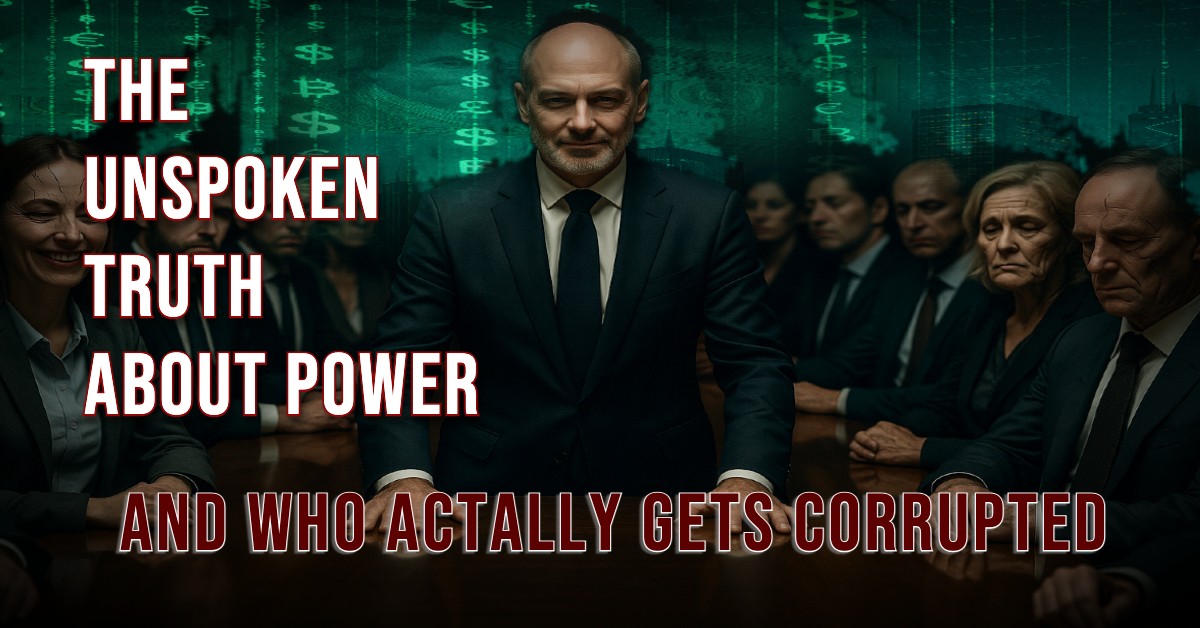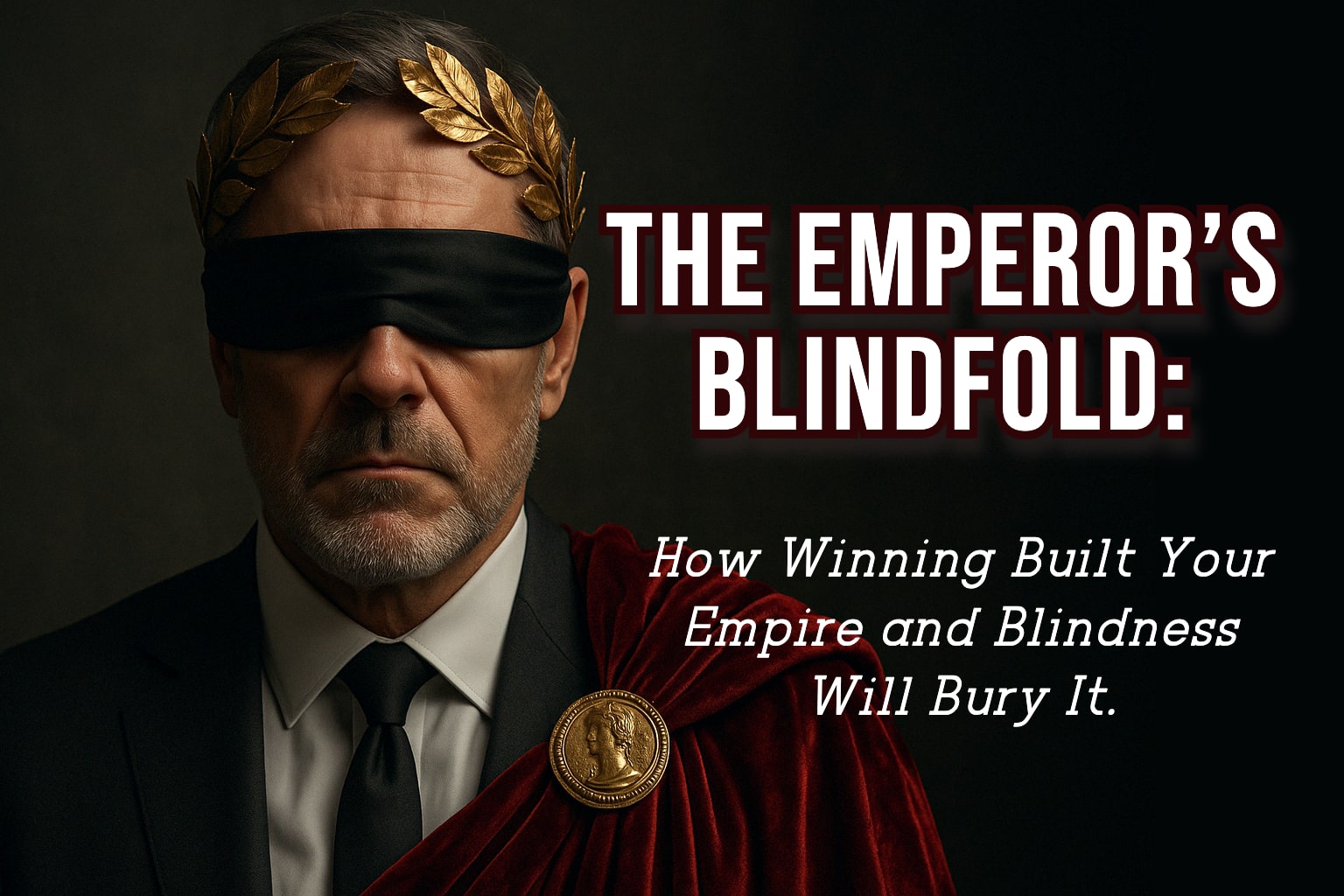The real danger of power isn’t what it does to the leader; it’s what it does to everyone who depends on that leader.
You’ve heard it said a thousand times: “Power corrupts, and absolute power corrupts absolutely.”
It sounds profound, right? It gets quoted in boardrooms, universities, and documentaries as gospel truth. And sure, plenty of historical evidence supports it: Seemingly good, ethical people turn into tyrants once they gain power.
But here’s the thing: that’s only half the story. It might not even be the right half.
Let’s shake the tree a bit and see what falls out.
The real issue isn’t just that power changes the person who wields it; it also changes the person who wields it. It’s that power corrupts everyone in the halo of that power.
Let that sink in: Everyone who becomes dependent on that power, whether financially, emotionally, or reputationally, begins to bend the truth, soften their words, or even betray their values to remain in the good graces of the powerful. It’s this that poses the greater danger.
So yes, power corrupts… but it’s not always about greed, ego, or megalomania. Sometimes, it’s simply a matter of survival. And in a world where meaning drives movement, we must understand what power means to those who orbit it.
Power Corrupts… Everyone in the Halo of That Power

When a leader rises in power, those whose lives depend on their approval are more likely to filter the truth.
Let’s cut to the chase. Power doesn’t corrupt just because someone becomes “bad.” The hard pill for most leaders to swallow is that power often corrupts because the people around the powerful stop telling them the truth.
Picture this: You’re the CEO of XYZ Corporation. You’re known as a principled leader who built a thriving culture, empowered your people, and made ethical decisions even when it was hard. Bravo!
But now you’ve got 1,000 people under your leadership. You ask your COO—let’s call her Amy—how well the team is receiving your recent strategic initiative? She tells you, “It’s going great!”
But is it? Really?
Most people aren’t dishonest; they’re just self-protective. Their livelihoods depend on staying in your good graces.
Ask yourself: How much unfiltered, hard-hitting truth are you actually getting from Amy? 90%? 80%?
Not even close.
If you’re fortunate, it’s 40%.
More likely? Somewhere around 30%.
Why? Because Amy has a mortgage. A car lease. Two kids in private school. A partner who has just launched a business. Her livelihood—her ability to pay for piano lessons, summer camp, and that long-overdue kitchen remodel—depends on you being happy with her.
Her number one job isn’t to tell you the truth. Her number one job is not to trigger your disapproval, because disapproval leads to distance, and distance leads to dismissal.
Leaders who confuse dissent with disloyalty teach their teams to prioritize emotional safety over honesty.
And that’s where your Emotional Source Code™ comes into play.
If your emotional blueprint unconsciously equates dissent with disloyalty, she will read that signal and recalibrate accordingly—even if you never say a word.
Some leaders say they want the truth, but punish it when it arrives. That trains people to soften the truth or stay silent.
You may want to ask yourself another hard truth: Some leaders say they want the truth; they may even believe they do, but when push comes to shove, the truth is not what they want.
They want validation. They want loyalty. They want their ego stroked, not their strategy sharpened.
They claim to want candor, but they reward conformity.
Even the most grounded, mission and purpose-driven advisors don’t stand a chance with these leaders.
Eventually, even the most loyal truth-teller gets dismissed, not for being wrong, but for being inconvenient.
The more insecure a powerful person is, the more likely they are to view honesty as betrayal.
Think about General Mark Milley or Anthony Scaramucci and so many others. Regardless of where you land politically, what played out in the first Trump administration is textbook: the influential leaders surround themselves with advisors they claim to trust, until those advisors deliver inconvenient truths.
Then suddenly, they’re disloyal. Disposable. Dangerous.
When a leader is addicted to identity and affirmation, there’s no oxygen left for feedback, let alone growth. Truth becomes not just costly, but unwelcome.
Truth Becomes Diluted as Power Grows
Neuroscience confirms: power alters perception. People adapt their behavior around the powerful, even when it leads to worse decisions.

Here’s the soul punch:
“The truth becomes more and more elusive the more power and control you have, because the more power you have, the more people are dependent on you, and the less likely they are to tell you the uncomfortable truth.”
It’s not a personality flaw—it’s a systemic flaw! The truth becomes more and more elusive the more power and control you have, because the more power you have, the more people are dependent on you, and the less likely they are to tell you the uncomfortable truth.
Let’s take a moment to explore social psychology. According to studies on social dominance theory and hierarchical dynamics, subordinates consistently overestimate the expectations and preferences of those in power. This scientific insight sheds light on how people unconsciously adjust their behavior to meet perceived preferences, even when doing so results in a lack of strategic success.
As a result, they unconsciously adjust their behavior to meet perceived preferences, even when doing so results in a lack of strategic success.
Amy’s filtered response isn’t because she’s dishonest. It’s because your position has altered the social contract. The closer someone is to power, the more their identity and paycheck are hooked into that orbit.
So Amy’s filtered response isn’t because she’s dishonest. It’s because your position has altered the social contract. The closer someone is to power, the more their identity and paycheck are hooked into that orbit. This shift in the social contract is a key factor in the distortion of truth in power dynamics.
The Beautiful Lie: Power Doesn’t Just Corrupt the Leader
Power creates curated realities. Your team gives you the version of the truth they think you want to hear.
Think about this:
You trust your inner circle. They want to keep their jobs. So, they protect you from bad news, harsh feedback, or dissenting perspectives. Which means you begin operating inside a curated echo chamber of your own making.
And this bubble? It’s not built maliciously. It’s built out of loyalty. Out of fear. Out of pragmatism.
Suddenly, you’re no longer leading based on real data; you’re steering the ship using the emotional sonar of those protecting you, not strategic radar.
Meanwhile, everyone around you just hopes you don’t crash into an iceberg.
The Myth of the Honest Advisor
Even the most loyal advisors are bound by economics. Survival needs shape their truth-telling.
Let’s say you challenge this premise. (which has happened a lot). You say, “No, Dov. My CFO, Bob? He tells me the hard truth. Always has.”
‘Cool. Let’s dig into that.’
- What’s Bob’s salary? Let’s imagine it’s $280,000 a year, plus bonuses.
- How does Bob spend that salary? Lake house. Kids in college. Spouse is not working.
- What happens if Bob gets fired?
- Everything changes.
It’s not about character, but the price of truth in an imbalanced power dynamic.
Bob’s not a liar. He’s a pragmatist. He has a micro-economy of dependence wrapped around your favor. And favor is fickle when threatened with truth.
So now let me ask again: What’s Bob’s real job? To keep the truth flowing up the chain? Or is it to keep the person who signs his checks emotionally regulated?
Don’t blame Bob. Blame the structure. The anatomy of meaning in your workplace may signal that truth is expensive, and harmony is safer.
Power Doesn’t Just Bend the Powerful, It Bends Reality!
When truth becomes too costly, even well-meaning leaders start making decisions based on illusion, not insight.
People around the powerful become mirror-holders. But those mirrors? They’re distorted. Warped by need, fear, admiration, or just plain old pragmatism.
As the powerful one, you start seeing what they want you to see. Not what’s real.
 That’s how empires fall!
That’s how empires fall!
Not just from greed or incompetence, but from informational erosion. It’s how the most intelligent leaders make dumb decisions, because even the most brilliant minds can’t make a good call with distorted data.
The Antidote? Truth Contracts
The only way to get the absolute truth is to contract someone with nothing to lose by telling it.
This is precisely why people in positions of power hire me, and people like me.
I’m not brought in to stroke their egos. Not to strategize over spreadsheets. But to tell them the truth, they can’t get anywhere else.
That means the whole truth… even when it stings.
When you remove the need for approval, truth becomes possible, and leadership becomes real.
The beauty of it is: I get paid in advance. That way, I don’t owe them anything emotionally. My insights can’t be bought or distorted. If they don’t like what I say? That’s okay, I can walk away.
It’s not arrogance. It’s integrity!
It’s the Identity Detox every leader secretly craves.
It’s a beautiful marriage of equals—one built on the understanding that what got you to the top won’t keep you there if you start believing your own curated mythology.
FAQs: Power, Corruption, and Truth
Truth requires structure. Without it, even honest people will self-edit to survive.
Q: Can power ever be held without distortion?
A: Maybe, but only if the powerful actively seek out truth-tellers, not sycophants. That takes courage, contract, and consequence.
Q: Is it inevitable that people around power become dishonest?
A: Not dishonest, but selectively honest. There’s a difference. Most people don’t lie. They self-edit. And that edit is based on survival, not strategy.
Q: What’s the best safeguard against corruption by power?
A: Build a culture where truth is more rewarded than harmony. A culture where dissent is welcomed, not punished.
Bring in outsiders who have nothing to lose by telling you what no one else will.
Power Corrupts… Everyone in the Halo of That Power (Revisited)
If you’re not building systems that reward truth over harmony, you’re building one that will blind you to what’s real.
Let’s revisit the core idea one last time.
Power doesn’t just twist the powerful. It distorts everything around them. The systems. The advisors. The culture. Everyone becomes a little more careful. A little less candid. And eventually, a little less truthful.
Not because they’re bad people. But because the stakes are high, and the truth is expensive.
So, if you’ve got power—or if you’re close to it—ask yourself:
- When was the last time someone told me something that made me squirm?
- Do I have anyone in my life who’s paid to tell me the truth, not protect my image?
- Am I leading in reality, or through a fog of filtered feedback?
Book your 15-minute Legacy Reengineering Session.
Conclusion: Don’t Just Lead—See
True leadership is the courage to welcome the uncomfortable mirror, not the curated one.
Conscious leadership isn’t about commanding from a throne. It’s about constantly sweeping the fog off the mirror.
Power doesn’t just corrupt. It blinds. It insulates. It comforts you into believing your reflection is accurate.
But here’s the uncomfortable truth: the more powerful you become, the more vital it is to invite in the inconvenient voice!
The one who isn’t afraid of offending you. The one who can tell you, “Hey, your fly’s down,” before you step on stage.
That’s not weakness. That’s strength! And it’s rare.
If you’re one of the rare few with the courage to hold up the real mirror… I’d say we must talk.
Stay humble.
Stay human.
And above all…
Stay Curious, My Friend. Stay Curious.




